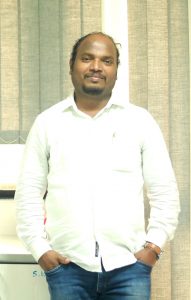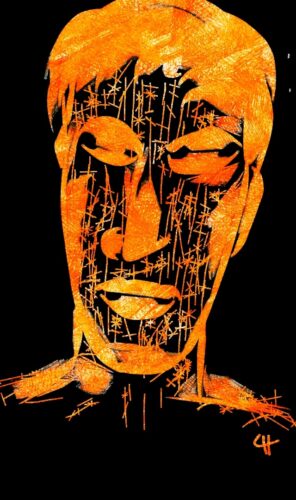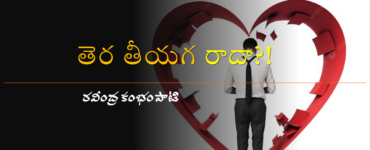 Dr. Pasunoori Ravinder is a Dalit writer-activist based in Hyderabad. A multifaceted personality, he established his credentials as a scholar-researcher, poet, essayist, short story writer, critic, orator and composer-singer. A poetry collection written in the background of identity movements, Ontari Yuddha Bhoomi (Lonely Battle Field) received wide acclaim in literary circles. Some of the translations of his poems were included in Sahitya Akademi’s bi-monthly, Indian Literature in its special number on 21st Century Telugu Poetry. His short story, “Turum Khan” was included in OUP anthology of Telugu Dalit Literature. His short story collection, Out of Coverage Area has won Central Sahitya Akademi Yuva Puraskar Award-2015 for its autobiographical themes and innovative techniques. His other awards include: Suravaram Pratapa Reddy Award–2015, Cash Award from Telangana Government, Gurram Jashuva Award–2015 and Dabarasam Puraskaram-2017, “Sahitya Ratna” award from Bharatiya Dalit Sahitya Academy.
Dr. Pasunoori Ravinder is a Dalit writer-activist based in Hyderabad. A multifaceted personality, he established his credentials as a scholar-researcher, poet, essayist, short story writer, critic, orator and composer-singer. A poetry collection written in the background of identity movements, Ontari Yuddha Bhoomi (Lonely Battle Field) received wide acclaim in literary circles. Some of the translations of his poems were included in Sahitya Akademi’s bi-monthly, Indian Literature in its special number on 21st Century Telugu Poetry. His short story, “Turum Khan” was included in OUP anthology of Telugu Dalit Literature. His short story collection, Out of Coverage Area has won Central Sahitya Akademi Yuva Puraskar Award-2015 for its autobiographical themes and innovative techniques. His other awards include: Suravaram Pratapa Reddy Award–2015, Cash Award from Telangana Government, Gurram Jashuva Award–2015 and Dabarasam Puraskaram-2017, “Sahitya Ratna” award from Bharatiya Dalit Sahitya Academy.
Pitch Darkness
Ramasami was lying on a cot in the front yard as random thoughts filled his mind like swarming flies.
When he looked back at his life, he could not but view the society as being despicable.
Sometimes, the anger was directed at himself, though inexplicable.
His worry was about how life had changed.
At the fag end of his life, there were not many who he could call his own.
Ramasami was not alone. Those who had sung and danced with him were not any better! Struggle for survival for all of them.
As he had closed his eyes, his past forty years flashed before him.
****
The play started. The whole village had gathered near the flagpole over the raised platform.
They had arranged curtains, and lights were lit
All of them were eagerly waiting for Ramasami.
Without him, the play would not be possible. If he could not make it, the play would have to be cancelled. He used to mesmerize the audience with his melodious recital of metrical poems. They used to say that there was none in the surrounding ten villages who could match his brass voice. Although illiterate, he was a good singer. There were no mike sets at that time, but his voice could reach the nearby four streets. If he started singing, people would not stay settled in their houses. Postponing domestic chores, they used to watch Ramasami perform. For those in the front rows, it was like a lit firewood for protection from cold weather. His physique perfectly matched his voice. Heavy personality with curved muscles! He was dark coloured, but that was sharp, attractive blackness! If he enacted the role of Lord Rama, the audience looked at him in awe as though the Lord had descended. If he had picked a bow and arrow like Arjuna, kapu women would surely fall for him.
Ramasami used to give touches to other actors too.
The patels who had kept the Madiga wada under their feet would also gather at that place.
“Ramasami is like a champion. Though born in Madiga gudem he had that talent for poems and songs,” they used to converse in private.
They sat on wooden chairs.
There was applause. Not for patels. Ramasami has made his entry on the stage.
Ramasami started reciting while enacting his role.
It was Bharatam play that day. Ramasami was performing the role of Arjuna. In that attire he was a dazzle. It appeared as though Arjuna had come from the clouds for that performance. Old women were greeting him with folded hands. His each recital was making the play more engaging. In the meantime, a female actor has entered the stage. The audience had wondered who that actress was! ‘Who must be the beautiful lady in Madiga community,’ they were all perplexed.
Paisa Rayamallu recognised her.
“Arre, that fellow appears to be our Ilaiah, is he not?” he said it aloud. There was a roar of laughter. “Orni, he is looking so attractive … in the role of Alli Rani,” they were all appreciation for him.
The play had started. Drums were beating. Anklets on toes were dancing to the rhythm of the song.
The argument between Arjuna and Alli Rani was going on animatedly.
Not only in their roles, in real life too Ramasami was Ilaiah’s brother-in-law.
Ilaiah too got immersed in his role.
“O bava! … shall we go the grove?” Alli Rani asked Arjuna coyly.
Quickly came the correction from Ramasami: “Osni, I am your brother-in-law outside, not in the play. Address me as ‘Natha!’’ he said in a taunting tone. The audience laughed heartily at this exchange.
Ilaiah thought he had to be careful about his performance. Otherwise, it would be difficult to control Ramasami if he had started hurling abuses.
He would chide him saying, “If your play does not appeal to the audience, why perform it?”
That’s why, those in the troupe were afraid of him. Nobody would ask him to give him a role. If a troupe member does not turn up, Ramasami would approach someone and for fear of being rebuked, he would express his unwillingness. “Vavvo, let the play be gone to winds, we’ll not face the scolding of Ramasami,” they would back away. Ilaiah knows this and so he was alert, and living his role in the play.
The play, made engaging with love and war scenes, would last until dawn.
The play had reached its midway part …
The audience were applauding, and Ramasami was enacting his role with finesse. ‘Is this fellow Ramasami or really Arjuna has descended,’ they were in awe. They thought it would be meaningful if they had offered something to him, so would rush onto the stage and offered gifts, ornaments, whatever they had which they could claim later. Ramasami’s stomach was filled with applause and acclaim. He didn’t take any food. For his performance in the play, not merely the village the flour-like moonlight also appeared to have come to a standstill.
Ramasami had learnt that art with passion. As a child, he used to visit his grandmother’s place in neighbouring village. There he used to watch the performance of Chindollu. He had taken a liking for it. He wanted to master it, so had approached the caste-elder and learnt it for about two years. He had gathered his friends and assigned suitable roles to them. Although they didn’t have the commitment of Ramasami, he had pressurised them to practice saying, “What’s the use of life? One should live like an artist!” So, he imposed the art over them. That way, he had prepared a troupe and found his vocation. Those who had come reluctantly to watch the play, now began to enjoy it and praised him for that.
Ramasami’s life was, thus, dedicated to such performances. He was so much used to those that he would feel bored if there was no show any day.
One day after completing the play, he had removed his make-up, but instead of going to his house for fear of being rebuked by his mother, he went to the house of peddavva. It was a story based on performance that would have lasted three nights. Ramasami was in deep sleep. The colony people who were watching the play the whole night, had woken up late that morning. People had gathered at the hut of Ramasami. Relatives and neighbours started wailing. Ellavva’s elder son, Malleshu had come to know about the death of Kattavva and came rushing to his house. Malleshu, eldest of all cousins, had woken up Ramasami who was reluctant to wake up, so Malleshu shook him up with hand. He slowly opened his eyes that were red like embers. “Why are you waking me up so early … I had no sleep last night …,” he said.
With tears in eyes, Malleshu replied, “Avva is no more …”
Ramasami could not understand at first. With a sudden jerk, he sat and asked, “Whose Avva …?”
“Tammi, our Avva, Kattavva, is dead …” he began wailing.
He quickly got up, and reached his hut in no time. Looking at his mother’s dead body, he had wept for a long time.
Ramasami was the only son of Kattavva. She had brought him up with affection. Looked after him well as his father had died when he was a child. Ramasami felt orphaned with his doting mother no more.
The next day, as part of the ritual, they went to the outskirts to feed the crows. Somebody must have informed him, barber Narsaiah had reached the graveyard. Each community has its own land for graves and performing last rites. Madiga community has their land abutting the tank. Ramasami came behind carrying a leaf-plate with rice and curry. By that time, other cousins and close relatives shaved off their heads and taking bath in the tank. Ramasami accompanied by his maternal uncles had reached the grave of his mother and placed the leaf-plate by its side.
Remembering his mother, Ramasami wept inconsolably. There was also a note of guilt in his wailing for not having been by her side when she had breathed her last. ‘He had grown up like a tree and without doing anything he was searching for roles. He never bothered to ask his mother whether she had eaten anything. He didn’t take part in her pleasure and troubles. But with this art only I’ll bring you name,’ he thought and offered a few drops of toddy to the grave.
His mother seemed to have heard him and soon a crow had flown near the leaf-plate and touched the food, a good omen for expiation of the deceased. Ramasami and his uncles felt reassured.
They were shaving off their heads. It was Ramasami’s turn. But surprisingly he refused to shave his head. “What’s that!? Your own mother died and you refuse to shave your head? Is your brain intact? Enough … Get along …” his father’s brothers and cousins were scolding him. But Ramasami stood his ground.
“Ehe … Nee yavva … the play is not yet over in the village … rest of the story will be completed tonight. If I shave off my head, who will perform that role? That’s why I don’t shave off,” he revealed the truth. His uncles and cousins were infuriated at this. ‘See his madness for the role … this much?’ they were at their wits’ end.
“Have we ever heard such words? Where did he get this streak? We’ve to follow our tradition …” they were reprimanding him by turns. Ramasami sat there with his head bent like a stone. “You can rebuke me in whatever manner you like … no question of shaving off my head …” His relatives were trying to convince him as very soon the sun would be over their heads. But they didn’t know how to make him understand the situation and change his decision.
Malleshu was about to thrash him in anger. “Thoo … she gave birth to you, doted you, is this the respect that you give to your mother? If villagers come to know about this, they’ll spit on you,” he scolded him
They had understood by now that he was stubborn in his decision, and so came down one step: “At least, shave your moustaches and beard. Partially, the ritual will be fulfilled,” an elderly person suggested.
Ramasami who had been silent all along, opened his mouth now: “For any performance, important thing is moustaches. No question of shaving it off. If I shave my head off and remove moustaches, will my mother come back? You are worried about unwanted things,” he said irritatingly.
With those words, not only the elders, even Malleshu became dumb. He appears like a person who does not join the community and prefers to go alone. Thinking that he would not relent, they slipped away one after the other. Ramasami was thinking about the story he would narrate that night.
The play has reached its last phase …
****
Time has moved really fast. In these twenty years, many changes had taken place. Nobody was interested in watching the plays. TVs, cinemas became the craze. As there was no audience, Ramasami, after getting married, had to work as daily wage labour to sustain the family.
Poems and songs had travelled from flagpole at the centre of the village to agricultural fields. Ramasami used to inspire his fellow labourers with his songs.
A few days passed that way. If the season was good, farmers and workers used to get food.
But the seasons didn’t favour for seven years, so the yield was poor. Ramasami suffered like many others. No succour was forthcoming from the government as they had expected.
In scorching heat, Ramasami turned to the vocation of breaking slabs of stone. But it was difficult for him to earn fifty rupees a day even if he had worked the whole day.
As he could not afford both ends meet, he had taken to drinking. When he was drunk, songs and poems surged forth from his tongue. Those who had seen Ramasami that time felt pained having come to know of his past.
For breaking stones that too in summer heat, proper diet was needed. Scarce to get rice from public distribution vendors. How can he afford good meal? Taking rice water or whatever remained, as he had continued to work amidst stones, his body shrank like the hill. He looked emaciated with pale face and bones in the body protruding. The beautiful features that once charmed patels and their wives were gone. Life, then, was like full moon day, but now it is like dark moon day. What has remained is the lean body struggling to survive and support his family.
With all his troubles of poverty, and with the iota of happiness he could get when drunk, it was the song that stood by his side. Only through hat medium, his inner feelings would find a vent.
He is reminded of the sufferings a king would undergo in his stories, and it naturally found an expression to suit the occasion. Their sufferings looked similar. In the story, the kind might win back his kingdom waging a war, but it is highly unlikely that Ramasami would find a way to bring his art and past life back.
The village has changed. Agriculture was no longer a bright proposition.
Except those in power, nobody seemed happy. A long journey from ‘Garibi hatao’ days to hitech mode in every walk of life. For the emaciated ones like Ramasami, it was only gudumba that offered solace. In Madiga gudems, its not known whether any other thing is available, but gudumba was easily available. To fill stomachs with arrack, one generation gave way to another. Nobody seemed to worry about death. They were living as though they were born only to die. Those who haven’t yet crossed fifteen years of age took to drinking.
In respect of middle-aged persons, no need to say anything. They didn’t care whether it was day or night. They used to indulge in binge drinking early in the morning, they didn’t stop it even after midnight.
Fed up, Ramasami had left his village and reaching a nearby town joined a cotton mill as daily wager. For two years, he could earn just enough for livelihood. But the dust and cotton wool posed a threat to his health. The tablets and tonics in government hospitals didn’t solve his problem. He had begun to think: ‘if he died, there would be someone to take his body to the grave in the village, who’s there in the town to call his own?” He had started his journey back to his village accompanied by his wife, Kanakamma.
After getting down the bus he looked at the flagpole platform that was demolished. He felt disturbed. It was all empty but Ramasami could see the mob that had gathered to watch his performance and hear whistles and applause.
“Are you able to walk?” Ramasami came into this world for the words of Kanakamma.
Shaking his head, he sat there in the bus stop. The village looked like a place looted in a war. He was like a vanquished king, and the village robbed and in ruins. He had consoled himself.
His fate was not favourable, he thought. He was too weak to think about the village. With the help of passers-by, he had reached his thatched roof.
Madig gudem was no different. People and huts were in dilapidated condition. To eke out a living, they had gone far and nearby places.
Ramasami was in desperate condition as there was no food to eat, no arrack to drink.
He was bed ridden with fever. He had no children to look after him. No heirs to continue the tradition of his art nor to share his loans and travails.
Kanakamma has been working and here and there and was offering just enough rice water to survive.
*****
“Hey, are you asleep still? …” asked Ramasami’s wife. He opened his eyes. She had brought a glass of rice water and asked him to drink.
But he didn’t feel like taking it. A kind of protest that he was dependent on his wife. “How I had lived, how am I now?” he felt dejected inside.
Despite Kanakamma’s beseeching he was not taking any food.
He closed his eyes again. Different thoughts filled his mind. ‘Nee yavva, what’s this life? So much struggle to survive? Life is worse if born in lower castes,’ like this, various thoughts.
Ramasami was peeved at not only food morsels, even fed up with life.
He was raging inside at the conditions that had made him come to this stage. He was refusing even water.
The play has ended.
Kanakamma could not grasp anything. Beseeching repeatedly, she had felt exhausted.
When the play would have reached its middle phase, at midnight, Ramasami had breathed his last.
A star had fallen on the village.
The Madigas who were there in the village had collected donations and placed the corpse on the bier.
The journey that had started with claps all around, reached its end near the hill on the east accompanied by drum beats
The village has now lost all its sheen and charm.
*
Glossary
Avva: mother
Chindollu: Those who perform the dance art form of Chindu Bhagavata. The art is associated with Madiga community; Chindu Bhagavatas were performed within their community.
Kapu: agricultural community.
Patel: rich landlord
Peddavva: mother’s elder sister
Waada, gudem: locality/colony meant for dalits
image: Rajasekhar Chandram









Damodar Rao has long been introducing young Telugu writers to the world outside through his translations of them into English. The present story in translation once again stands proof to Damodar Rao’s felicity of containing the spirit of the idiom of both the native Telangana language and its culture. I congratulate Pasunoori too.
అన్నా ధన్యవాదాలు.
మీ ప్రేమకు ప్రోత్సాహానికి జై భీములు…